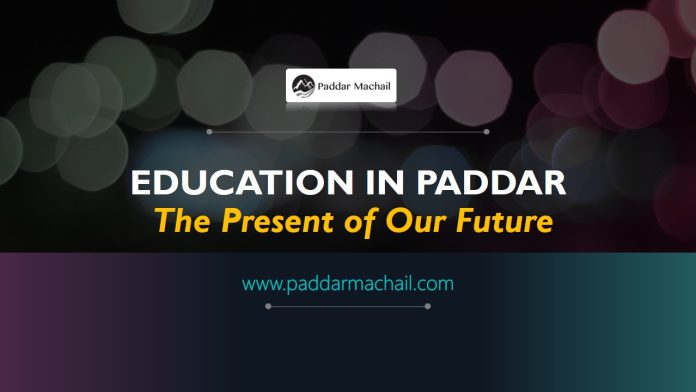By: Ravinder Chauhan
Education is widely acknowledged as an important public treasure and a social responsibility. The benefits it produces to the society are diverse and widespread over various spheres of development and flow for a long period including generations after generations.
“The main hope of a Nation lies in the proper education of its youth” said Erasmus.
The above quote illustrates the importance of education. It is the duty and responsibility of society as a whole to create a conducive environment, where every child can achieve perfection in every field of modern education.
In Paddar subdivision, since the time of independence we are struggling hard to get education. Educational graph of Paddar Pargana since Independence is not good and undulating. For years Paddar was isolated and remains cutoff from the rest of the world because of its typically tough topography. In 1990, Paddar was connected with motor able road, thanks to the Beacon (GREF).
Major investment in the education sector will be necessary to exploit demographic dividends. Tomorrow’s workers are today’s child. Tomorrow’s teachers, doctors, engineers and leaders are today’s children. Our future is our present.
Watch documentary on Paddar by Ashish Chouhan:-
There was oral tradition of imparting education to the masses in the past when there was no pen and paper. Although they knew nothing about literature or letters, but they were uniquely skilled in their traditional knowledge of handicraft, tools and usage other natural resources that were essential for very survival and resurrection. They were far more advanced than now; they not only kept the traditional knowhow of very area but also transmitted it orally to next generation. They knew nothing about science and scientific inventions but their traditional knowledge of medicinal herbs, agricultural practices were of par excellence. Every household essential was locally produced and used. Also, we have heard in our scriptures about educating the masses under tree shades and writing on birch paper (Bhojpatre) is the height of learning how they are anxious to get education.
Today we are living in a welfare state and all the educational expenditure is borne by the government. In 1975, education was put in the concurrent list which paved the way for various government plans and policies to bring much needed changes in our education system.
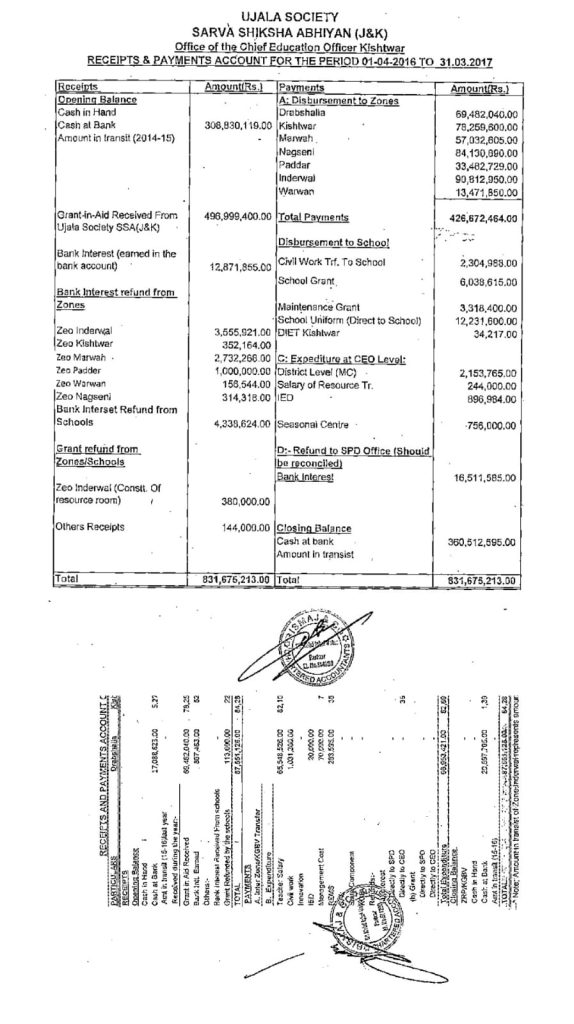
There is no dearth of funds and every year the Government through its various agencies is increasing funding for educational purposes. Governments and its various agencies are doing their best to achieve 100% literacy rate and universal elementary education. Apart from the benefits of Right to Education (RTE) act, Govt. is pushing hard in its sincere bid to provide each and every school sufficient affirmative supports. Every rural Govt. Primary and Upper Primary schools are entitled to these school level SSA grants every year.
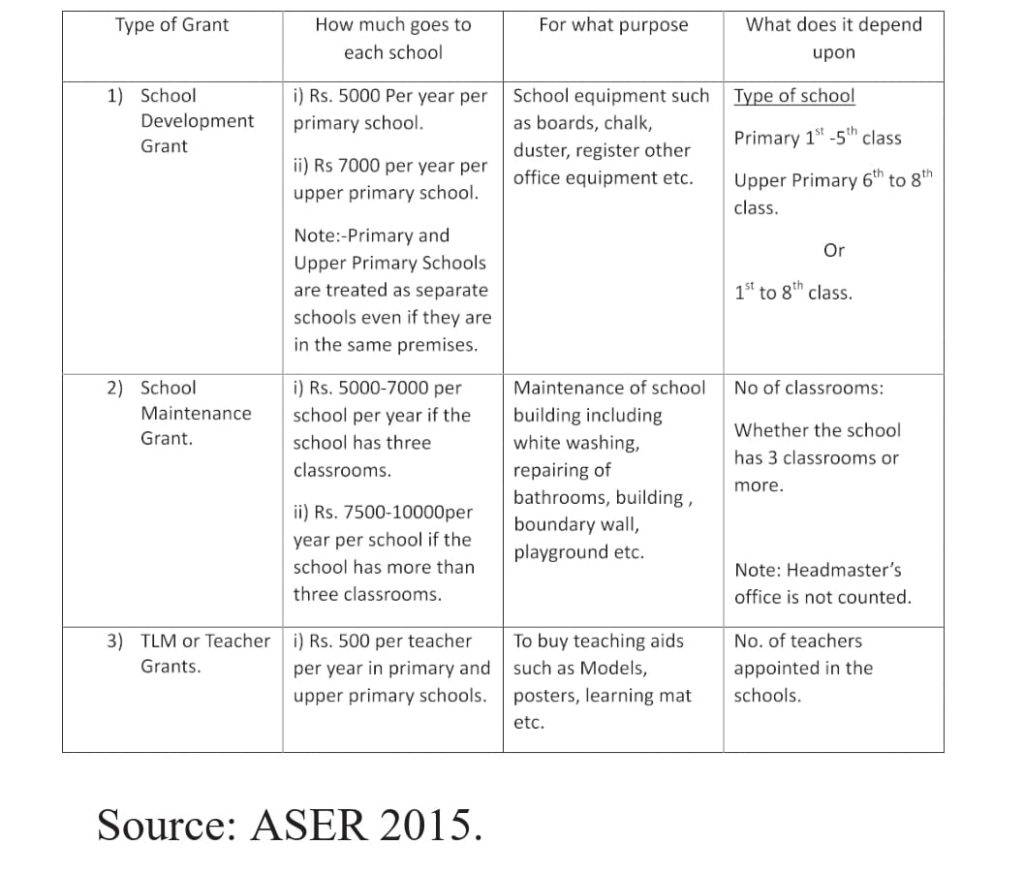
Source: ASER 2015.
Besides these funds for the development of school infrastructure, basic needs of the students are also being provided which include 2 sets of uniform, free text books, MDM (Mid-Day Meal), scholarships up to class 8th standard etc.
Educational Scenario of Subdivision Paddar :- Paddar, known for its distinct culture, lies in some 60 kms extreme east of Kishtwar. This region is one of the socially and educationally backward area is limping hard to achieve the educational goals of 21st century.

There is a 10.1 percentage point increase in literacy rate from 2001 to 2011. The gap between male and female literacy rate is much bigger and need to be addressed. In our society, least priority is given to female education. The female education is must for the overall development of the family. In the words of Pt. Jawahar Lal Nehru “If you educate a man, you educate an individual. If you educate a woman, you educate a whole family.” This statement has a deep rooted meaning in it. Literate mothers have unique power to steer the family and foster the siblings. An educated mother can create a civilized aura in the family and even protect her children from ills of health and society. A comparative table is given below :

This census figure also indicate that we are far behind in female literacy rate than that of district and state as a whole. This table also shows that 69.20% male of Paddar are literate as against 71.75% for the whole district. Also, the %age of female is 41.08% for Paddar as against 44.13% for the district Kishtwar and 58.01% for the state.
Long term initiatives boosted by SSA, RMSA, MDM in subdivision Paddar resulted in unprecedented improvement in the educational attainments at the elementary level. Universalization of elementary education and gradual increase in the enrolment of students at elementary levels of education (especially girl child) is perhaps the biggest achievement. The coverage area, number of schools, other educational institutions imparting elementary education has increased many folds. There were 2 learning centers in Paddar before Independence. After Independence this number went up to 47 up till 2000AD. Further boosted by SSA, 32 new schools have been opened in a short span of 10 years (2001- 2010), which includes one KGBV.
Class wise enrollment of zone Paddar as on May 2018
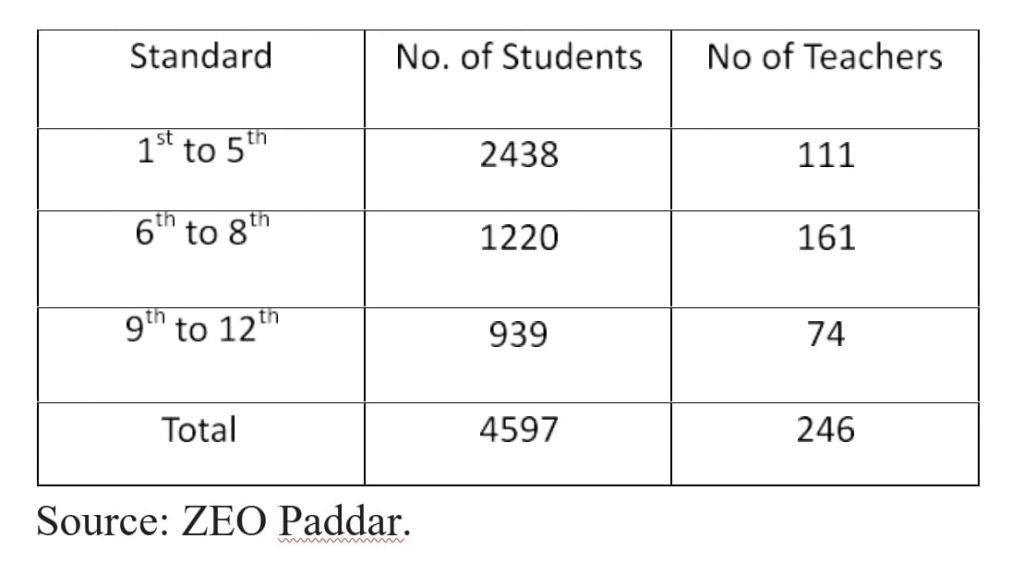
The total enrolment in Paddar subdivision as on May 2018 is 4597 in which 2472 are boys and 2125 are girls. The category wise enrolment of students is given in the below table.

In Paddar subdivision alone we have 46 Primary schools, 21 Middle schools, 7 High schools and one Higher Secondary School. Apart from this we have 6 private schools and one KGBV. BVM Affani was the first private school opened in 1989. There are total of 4597 school going students in Paddar out of which 3349 students are studying in Govt. schools and 1248 in private schools. About 72.80 % students are getting their education in govt. schools.
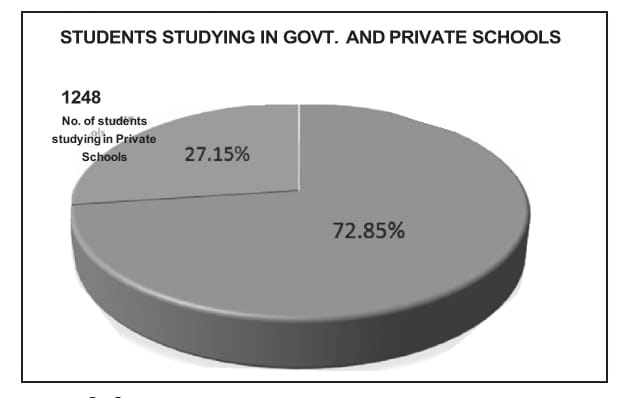
It also shows that a big chunk of students are preferably studying in govt. schools. So the future of Paddar mostly relies on the performance of Govt. schools.
Basic Education: – Challenges and chances
There are various challenges before us, in imparting the basic education. Various socio-economic factors such as poverty, parental education levels, social background of school going children and other difficult circumstances that are prevailing in our social setup, understaff schools etc. must be identified and addressed positively. Area specific or village specific actions should be taken by the government in collaboration with parents and teachers to bring substantial changes in our education system.
Also we have to mobilize the available resources with us. We have a good man and mental powers if utilized properly can bring desirable changes in our education system. We have a good number of Aanganwari centres and Aanganwari workers. Every village, every hamlet of Paddar has an Aanganwari centre. Apart from nutrition, the role of these centers is crucial for the achievement of educational goals . Pre-school education is compulsory as it facilitates the process of socialization of the child, necessary to make most of the classroom learning.
Human beings are not born with pre-determined instinctive traits like other animals are. A child is not intelligent or duffer by birth. But our socialization makes it so. The socio cultural environment of a child matters more in the overall growth of a child. The socialization process of human child and its personality occurs through the internalization of values and ways of social behaviors that our social system approves. In addition , human beings not only learn from culture and society but also imitates the prevailing values in the system. So, we must be aware as a parent/teachers to provide conducive environment for the overall growth of a child.
Role of Parents:
Parents are the first teacher of their children. Schools and books cannot accomplish what the parents can in the education of their children. It is an admitted fact that parents are the best teachers of their children. So, the parents must take sincere steps to foster their children right from the early years. To cut the evil at its buds is a well-known proverb. Hence in this digitally connected world, a sharp and sensed caring of students is needed. Otherwise, all the educational feeds would spoil the very career of the students. In the whole system of education, parents play a vital role in shaping the future of their wards/children.
Parents support and involvement in the education of child is crucial and critical. Parents must take their responsibility in teaching and guiding their wards. Parents especially mother plays an important role in shaping the future of the students. According to National Achievement Survey (NAS) 2017, parents’ support and involvement in school activities is disconcerting. Teacher do not get enough support from the parents in the villages on the part of school curriculum. The report reads as:
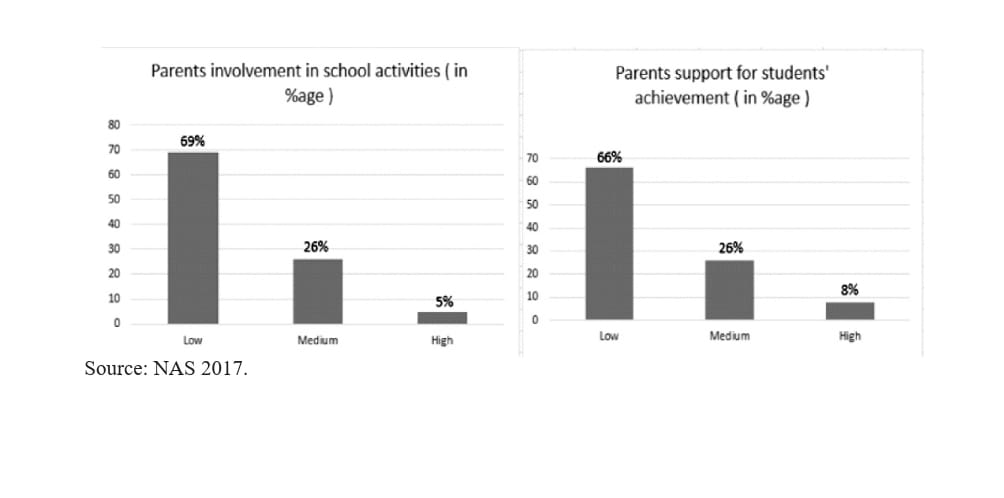
Source: NAS 2017.
Dedicated and devoted efforts of parents are essential to raise the graph of education in Paddar. Some special and sensitized sessions should be conducted for the parent to make them realize the significance of education of their children.
Role of Teachers:-
Teachers play a pivotal role in the development of any society. In this digital world, the teacher must equip himself with modern techniques of teaching. Today we talk about digital boards, smart classrooms etc. But are our teachers prepared for the same? So, more focused approach should be laid on teachers training to equip them with modern teaching aids and learning environment. Teaching is a noble profession. A teacher must feel proud in teaching the downtrodden in remote villages and lift the lot of the poor.
Once Abraham Lincoln wrote a letter to the teacher of his son, I want to quote “My son will have to learn, I know that all men are not just, all men are not true. But teach him also, that for every scoundrel, there is a hero. That for every selfish politician, there is a dedicated leader. Teach him that for every enemy there is a friend. It will take time I know but teach him if you can, that a dollar earned is far more value than five pounds. Teach him to learn to lose and also enjoy winning. Steer him away from envy. Teach him if you can the wonder of books- but also give him the quiet time to ponder over the internal mystery of birds in sky, bees in buds. In school teach him, it is more honorable to fall than to beat. Teach him to be gentle with gentle people and tough with tough. Teach him if you can how to laugh when he is sad. Teach him there is no shame in tears. Teach him to scoff at cynics and to beware of too much sweetness. Teach him to sell his brawn and brain to the highest bidders but never to put a price tag on his heart and soul. Treat him gently but do not cuddle him because only the test of fire make fine steel. Let him have the patience to be brave. Teach him always to have sublime faith in himself because then he will always have sublime faith in mankind… ”
A child pleads for our help, he wants us to be with him/her like the charioteer “Krishna”. We as a teacher/ parent must answer all the queries a child ask. Children are born to stumble and we to help and heal them. We teacher/parents, as educators have to just ignite the curiosity, confidence and sense of learning in them.
Let education accept the challenges to assist in creating the environment for the individualized action plan that aims to transform every person into personality. To sustain and make it better for generations ahead, we all must realize the value of sharing and caring that emerges instinctively from the internal beauty of human beings.
The development of any region caste, culture depends fully on the education of its people. Therefore to spread awareness among the rural masses about the need and significance of education, more efforts have to be taken by the Govt. agencies, educated youths, teachers and parents. Before closing my thoughts I want to quote few lines of a great English poet Robert Frost.
“The woods are lovely, dark and deep And I have miles to go before I sleep And I have miles to go before I sleep”
(The author is a teacher in the Education Department, J&K Govt.)
— 000 —


